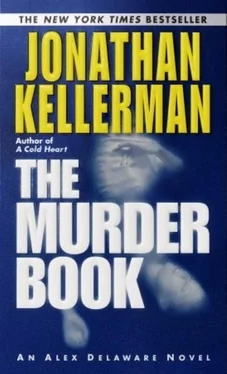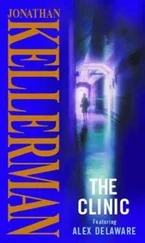The restaurant was compact and dark, with a copper-topped bar and a half dozen tables set with white linen. The walls were raised walnut panels, the ceiling repousse tin. Inoffensive music on low volume competed with low conversation among three white-aproned waiters old enough to be my father. I couldn't help but think of the Left Bank bistro where Robin had told me of her plans.
I buttoned my jacket and allowed my eyes to acclimate. The sole patron was a dark-haired woman at a center table peering into a glass of burgundy. She wore a form-fitted, whiskey-colored tweed jacket over a cream silk blouse, a long, oatmeal-colored skirt with a slit up the side, beige calfskin boots with substantial heels. A big leather bag sat on the chair next to her. She looked up as I approached and gave a tentative smile.
"Dr. Gwynn? Alex Delaware."
"Allison." She placed her bag on the floor and held out a slender white hand. We shook, and I sat.
She was a long-stemmed beauty out of John Singer Sargent. Ivory face, soft but assertive cheekbones highlighted with blush, a wide strong mouth shaded coral. Huge, judiciously lined deep blue eyes under strong, arching brows studied me. Warm scrutiny, no intrusiveness; her patients would appreciate that. Her hair was a sheet of true black that hung midway down her back. Circling one wrist was a diamond tennis bracelet; the other sported a gold watch. Baroque pearls dotted each earlobe, and a gold link cameo necklace rested on her breastbone.
Her hand returned to her wineglass. Good manicure, French-tipped nails left just long enough to avoid frivolousness. I knew she was thirty-six or -seven but despite the tailored clothes, the baubles, the cosmetics, she looked ten years younger.
"Thanks for your time," I said.
"I wasn't sure if you were a punctual person," she said, "so I ordered for myself. I only have an hour till class." Same gentle voice as over the phone. She waved, and one of the ancient waiters tore himself away from the staff confab, brought a menu, and hovered.
"What do you recommend?" I asked.
"The entrecôte is great. I like it rare and bloody, but they've got a pretty good selection of more virtuous stuff if you're not into red meat."
The waiter tapped his foot. "What're you drinking, sir? We've got a good selection of microbrews." I'd expected a Gallic accent, but his drawl was pure California- surfer boy grown old- and I found myself musing about a future where grandmothers would be named Amber and Heather and Tawny and Misty.
"Grolsch," I said. "And I'll have the entrecôte , medium rare."
He left and Allison Gwynn smoothed already-smooth hair and twirled her wineglass. She avoided my eyes.
"What kind of work do you do at St. Agnes?" I said.
"You know the place."
"I know of it."
"Just some volunteer work," she said. "Mostly helping the staff cope. Do you still work in oncology?"
"No, not for a while."
She nodded. "It can be tough." She drank some wine.
"Where do you teach?" I said.
"The U., adult extension. This quarter I'm doing Personality Theory and Human Relations."
"All that and a practice. Sounds like a busy schedule," I said.
"I'm a workaholic," she said, with sudden cheer. "Hyperactivity channeled in a socially appropriate manner."
My beer arrived. We both drank. I was about to get down to substance, when she said, "The girl you described. Would that be Caroline Cossack?"
I put down my mug. "You knew Caroline?"
"So it was her."
"How did you know?"
"From your description."
"She stood out?"
"Oh, yes."
"What can you tell me about her?"
"Not much, I'm afraid. She stood out because of how they labeled her. There was a pink tab on her chart, the only one I'd seen. And I'd seen most of the charts, was a gofer that summer, running errands, picking up and delivering files. They used a color-coding system to alert the staff if a kid had a medical problem. Yellow for juvenile diabetes, blue for asthma, that kind of thing. Caroline Cossack's tab was pink and when I asked someone what that meant, they said it was a behavioral warning. High risk for acting out. That and your saying it might be a police case helped me put it together."
"So Caroline was high risk for violence."
"Someone thought so, back then."
"What specifically were they worried about?" I said.
"I don't know. She never did anything wrong during the month I was there."
"But she was the only one labeled like that."
"Yes," she said. "There weren't a lot of kids, period. Maybe thirty. Back then Achievement House was exactly what it is today: a repository for rich kids who fail to perform to their parents' expectations. Chronically truant, drug-abusing, noncompliant, children of the dream."
I thought: Take away the dream and you had Janie and Melinda.
"But," she went on, "they were basically harmless kids. Other than the obvious sneaky doping and drinking, nothing seriously antisocial went on that I saw."
"Harmless kids locked up," I said.
"It wasn't that draconian," she said. "More carrot than stick. High-priced baby-sitting. They locked the doors at night, but it didn't feel like a prison."
"What else can you tell me about Caroline?"
"She didn't seem scary, at all. I recall her as quiet and passive. That's why the behavioral warning surprised me."
She licked her lips, moved her wineglass aside. "That's really all I can tell you. I was a student volunteer, fresh out of high school, didn't ask questions." Her face tilted to the left. The enormous blue eyes didn't blink. "Bringing up that place is… not the most fun thing I've done all week. Larry told you about my experience there with Larner."
I nodded.
"If the same thing happened today," she said, "you can bet I'd be a lot more proactive. Probably page Gloria Allred, close that place down, and walk away with a settlement. But I'm not blaming myself for how I handled it. So… have you worked with the police for a while?"
"A few years."
"Do you find it difficult?"
"Difficult in what way?" I said.
"All the authoritarian personalities, for starts."
"Mostly, I deal with one detective," I said. "He's a good friend."
"Oh," she said. "So you find it fulfilling."
"It can be."
"What aspect?"
"Trying to explain the unexplainable."
One of her hands covered the other. Jewelry everywhere else, but no rings on her fingers. Why had I noticed that?
I said, "If you don't mind, I have a few more questions about Caroline."
She grinned. "Go ahead."
"Did you have much personal contact with her?"
"Nothing direct, but I was allowed to sit in on some therapy groups, and she was in one of them. General purpose rap session. The leader tried to draw her out, but Caroline never talked, would just stare at the floor and pretend not to hear. I could tell she was taking it in, though. When she got upset, her facial muscles twitched."
"What upset her?"
"Any personal probing."
"What was she like physically?" I said.
"All this interest twenty years later?" she said. "You can't tell me what she did?"
"She may have done nothing," I said. "Sorry to be evasive, but this is all very preliminary." Unofficial, too. "A lot of my work is random archaeology."
Both her hands cupped her wineglass. "No gory details? Aw shucks." She laughed, showed perfect teeth. "I'm not sure I'd really want to know, anyway. Okay, Caroline, physically… this is all through the perspective of my seventeen-year-old eyes. She was short, kind of mousy… a little chubby- unkempt. Stringy hair… mousy brown, she wore it to here." She leveled a hand at her own shoulder. "It always looked unwashed. She had acne… what else? She had a defeated posture, as if something heavy sat on her shoulders. The kids were allowed to dress any way they wanted, but Caroline always wore the same shapeless dresses- old lady's housedresses. I wonder where she found them."
Читать дальше












